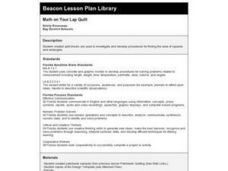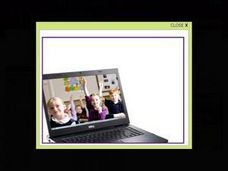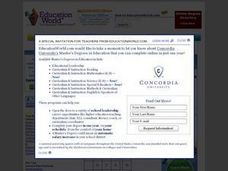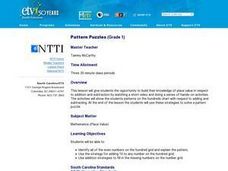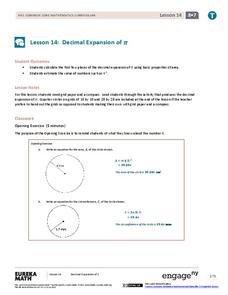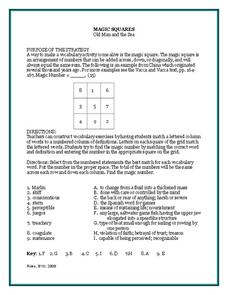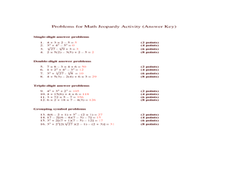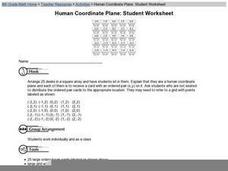Curated OER
Math On Your Lap Quilt
Get creative juices flowing when you allow groups to figure out a procedure for how to find the area of squares and rectangles. They may use the individual patchwork blocks, or they may design one using the Design Template.
Common Core Sheets
Determining Coordinates: Reading Positive & Negative Coordinates
For kids who have a hard time with graphing, a grid with coordinates can look like an unsolvable puzzle. A series of worksheets uses symbols and shapes like hearts, stars, and letters to help kids find the correct coordinates.
Radford University
What’s Your Party Like? An Exploration of Area
Who knew that a party is all about the area. Individuals draw out a patio on grid paper while planning to host a party. Using colored paper to represent the total area of the patio, learners cut out furnishings to add to the patio,...
Curated OER
Grid and Percent It
Students explore percent. In this percent lesson, students investigate how to represent percentages on a hundreds grid. Working independently, students solve mathematical problems involving percentages.
Curated OER
It All Adds Up Puzzle #19
In this addition math puzzle learning exercise, students insert the correct digits in a puzzle grid so that the rows, columns and diagonals add up to the numbers given.
Curated OER
It All Adds Up: Puzzle #11
In this addition puzzle learning exercise, students fill 10 blanks in the rows and columns of a puzzle grid. Students add across and down; sums must equal the number given at the end of each row. Students may not repeat any digits in a...
Curated OER
It All Adds Up Puzzle #29
In this addition puzzle worksheet, students complete a 12 space grid in which rows and columns add up to be the numbers given. Students fill in the missing addends.
Curated OER
It All Adds Up Puzzle #13
In this addition puzzle worksheet, students complete a 12 space grid in which rows and columns equal the numbers given. Students supply the missing addends.
Curated OER
Pattern Puzzles
A short video introduces place value in addition and subtraction. As a class, your students identify all even numbers up to one hundred and explain the pattern. They use addition strategies to fill in the missing numbers on the number grid.
Scientific American
Life-Sized Drawing
Ocean explorers or mathematicians research the wreck of the CSS H.L. Hunley. They investigate the actual dimensions of the Hunley using math and measuring skills. Afterward, they sketch a large scale drawing of the submarine outdoors on...
EngageNY
Decimal Expansion of Pi
Develop a better understanding of the value of pi. Learners explore the area of a circle using estimation and graph paper. While continuing to estimate the area of the circle using smaller and smaller grids, the number pi emerges.
Curated OER
The Old Man and the Sea: Magic Squares
Review the vocabulary from Ernest Hemingway's The Old Man and the Sea with a magic squares activity. To find the magic number, readers match the numbers on a grid with the words and definitions from the novel.
Curated OER
Solving Algebraic Equations: Algebra/Geometry Institute
Students solve problems using PEMDAS. In this algebraic equations lesson, students evaluate expressions using real number properties. They play "Math Jeopardy" to reinforce the order of operations.
Virginia Department of Education
Graphing Linear Equations
Combine linear equations and a little creativity to produce a work of art. Math scholars create a design as they graph a list of linear equations. Their project results in a stained glass window pattern that they color.
Florida Center for Instructional Technology
Two for One Box Company
Given a box of certain dimensions, young mathematicians must determine if a box that is twice as big, actually holds twice as much. This is a brain-teaser of a problem. The worksheet provides a handy table that has learners calculate the...
Curated OER
Two for One Box Company
Here is a challenging and thought-provoking math worksheet. In it, learners work together to construct a variety of boxes of different sizes to see if doubling the size of a box really means it can hold twice as much stuff as the...
Exploratorium
Beyond Dominoes: Polyominoes
Dominoes, polyominoes, tetrominoes, and pentominoes are the subject of this interesting math activity designed for middle schoolers. Pupils cut out shapes that are embedded in a worksheet in the plan, and experiment with them by taping...
Curated OER
Human Coordinate Plane: An Array of Desks
Use a kinesthetic activity to elucidate ordered pairs and coordinate planes. Arrange desks in a square array and distribute to learners cards with ordered pairs based on the locations of their seats. By having various groups of learners...
Curated OER
Human Coordinate Plane: Student Worksheet
An excellent way to teach the basics of coordinate graphing is here for you! Young mathematicians take on the identity of one of the two numbers in a coordinate pair, and the entire class must arrange themselves in the proper order. This...
Curated OER
Transformations and Translations in Geometry
In this transformations and translations in Geometry activity, learners use geometric shapes and grids to translate six transformations in each of two activities.
Curated OER
Off the Grid
Students examine the advantages and disadvantages of renewable and non renewable energy sources. In this engineering lesson students explain what it means for a house to be "off the grid".
Google
Surveys and Estimating Large Quantities
Looking for an estimation activity a bit more involved than the typical "guess the number of jellybeans in the jar" game? Here, learners use a picture to estimate the number of people at a large event, look for potential problems with...
Curated OER
Hopping by 2s
Hop to it! Young counters practice skip counting by two using illustrations of animals hopping from place to place. Each image shows a number sequence and scholars draw in the path as they move from number to number. Encourage them to...
Mathematics Assessment Project
Discovering the Pythagorean Theorem
Young mathematicians join the ancient order of the Pythagoreans by completing an assessment task that asks them to find the area of tilted squares on dot paper. They then look at patterns in the squares to develop the Pythagorean Theorem.


